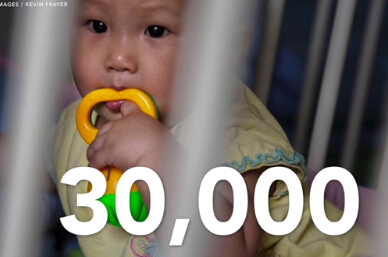China's more than 30-year-old one-child policy is drawing to a close. The country's lawmakers passed an amendment to the policy, and it's plain and simple: "The state advocates that one couple shall be allowed to have two children."
中國實行30多年的獨生子女政策即將結束。中國立法者通過了一項修正案,即“國家提倡一對夫婦生育兩個孩子”。
The policy was put in place to stave off rapid — and potentially damaging — population growth in the country. Officials were worried there would be too many people with too few resources available to them.
獨生子女政策的實施是為了防止迅速,且具有潛在危害的人口增長。官員擔心人口太多而資源太少。
But three decades later, China's population is growing old, and there aren't enough young people to balance the scales.
但三十多年后,中國的人口正在老齡化,而且沒有足夠的年輕人來平衡。

The Wall Street Journal cites United Nations data that estimates "the number of Chinese people over the age of 65 will jump 85% to 243 million by 2030." There are currently about 131 million Chinese people over age 65 in the country.
《華爾街日報》援引聯合國的數據,估計到2030年中國65歲以上的人口猛增百分之85達到兩億四千三百萬。目前中國65歲以上人口為一億三千一百萬。
But there's a possible problem: Some suggest a change in policy won't be enough to encourage more childbirth in the country.
但可能有一個問題:一些人認為政策上的變化不足以鼓勵生育更多的孩子。
"The cost of living is very high in Chinese cities like Beijing, Shanghai. Many couples may choose to opt out of having a second child".
“中國城市的生活成本非常高,比如北京、上海。許多夫婦可能會選擇不生育第二個孩子“。
And that sentiment seems to be backed by the numbers. In January, state-run Xinhua reported an estimated 30,000 Beijing couples applied to have a second child under the country's relaxed regulations on the one-child policy. Officials expected at least 50,000 would have applied.
這種觀點似乎得到了數據上的支持。一月,據新華社報道,3萬對北京夫婦在國家放寬獨生子女政策下申請了第二個孩子,而官方預計至少會有5萬對夫婦。
China's one couple, two-child policy takes effect Jan. 1, 2016.
中國一對夫婦二個孩子政策將于2016年1月1日生效。
譯文屬可可原創,僅供學習交流使用,未經許可請勿轉載。











